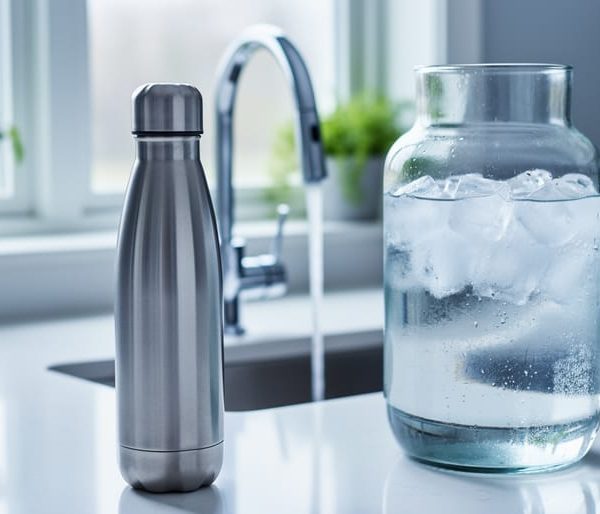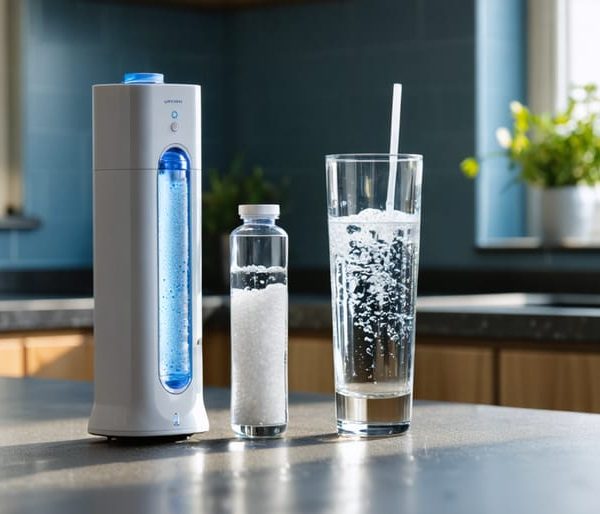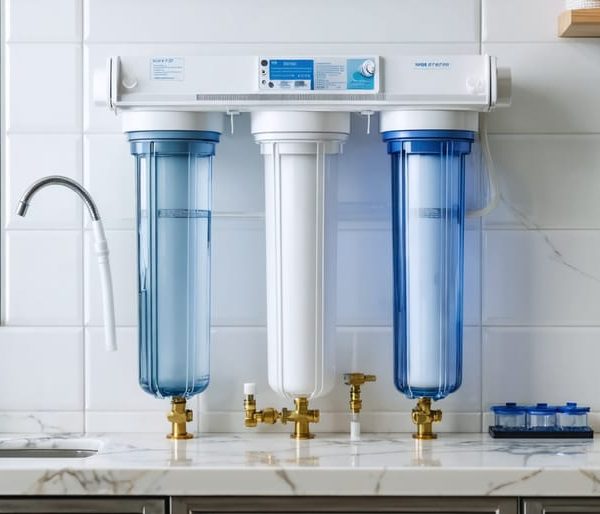Reverse osmosis vs water softener points to a comparison in their approach to softening hard water. While a water softener softens the water in your house, reverse osmosis does a whole lot more than resolving the issue of water hardness. Reverse osmosis and water softeners are two of the most powerful water treatment systems for your household.
As you read further, you will learn how reverse osmosis and water softener function, along with their advantages and disadvantages.

The Reverse Osmosis System
A reverse osmosis water filtration system utilizes multiple filtration phases or processes to filter out mineral ions and various agents of contamination present in the water. Every filtration phase of the RO system has a particular purpose.
The RO membrane of the reverse osmosis water filtration system is the heart of this filtration system. It is the key reason the reverse osmosis system is superior to many other water filters.
Reverse osmosis rids us of water contaminants that alter the taste of the drinking water, which can eventually have an adverse effect on our health. Therefore, frequent buyers of processed and bottled water should opt for the reverse osmosis filtration system to save on the cost of drinking water.
How Does the Reverse Osmosis System Work?
Before we go into the details of the RO system, let’s a better idea of the process with this video:
During this filtration process, the water being supplied flows through multiple filtration phases before it arrives at the membrane of the RO system. At this point, the water is pumped at a very strong pressure through the membrane of the RO system.
The reverse osmosis membrane consists of nano-sized pores that can trap even the tiniest contaminants trying to pass through the filtered water to the other side.
The reverse osmosis filtration system works by forcing water through the membrane of the RO system and simultaneously draining out the contaminants trapped on the other side. The RO system is a good choice for the whole house because they get softened water depleted of contaminants.
The RO system yields a lot of water that can be considered waste during its filtration process. For instance, 8 gallons of untreated water go into the reverse osmosis filtration system, and 6 gallons will come out as wastewater. The remaining 2 gallons of treated water will go into the water supply of the whole house.
RO system manufacturers are trying to design improved versions of the reverse osmosis system to yield a lesser volume of wastewater for each gallon of treated water.
The reverse osmosis system typically comes in three different sizes: 50 gallons capacity, 80 gallons capacity, and 100 gallons capacity. The size of your family or the level of water contamination plaguing your household decides which one you should consider.
Advantages of the RO System
RO Systems Improve the Taste of Water
If your water has an unpleasant taste, the RO system is your go-to water treatment system. They eradicate water contaminants such as bacteria, lead, and chlorine.
The reverse osmosis filter improves the quality of the water we use to drink and cook.
RO Systems Frees Your Water from Pathogens
When it comes to filtering well or underground water, the reverse osmosis filter is the ideal choice. Reverse osmosis removes harmful pathogens such as viruses and bacteria, giving you safe drinking water, among other uses.
Due to the abundant presence of microorganisms underneath the ground, it’s natural that the water will be plagued with all sorts of microbes. However, due to their miniature size, they are invisible to the naked eye.
The reverse osmosis system is your best bet to remove these pathogens and eliminate their harmful effect on the water supplied to your home for drinking and cooking.
RO Systems Are Very Comprehensive
The reverse osmosis filter leaves no stone unturned in its quest to provide safe, wholesome, and pure water for the household. It is unarguably one of the best water treatment systems in the market, known for removing almost every impurity from your drinking water.
Disadvantages of the RO System
RO Systems Waste a Lot of Water
Reverse osmosis systems are known to be very wasteful in their filtration process. The wastage is not environment-friendly, and it speaks volumes of the very high amount of hard water required for reverse osmosis systems to provide an adequate amount of softened water for household use. So in water softener vs reverse osmosis, that’s one point down for the RO system.
RO Systems Are Expensive
At the very least, the RO system costs several hundred dollars which cuts out many potential buyers. Another point down for reverse osmosis in water softener vs reverse osmosis in tackling hard water.
A Faulty RO Membrane Renders Filtration Ineffective
The RO membrane is the engine of the reverse osmosis system. One should check it regularly to make sure it is not worn out or torn. A faulty membrane permits contaminants to flow through with the water. At the end of the process, you get bad-tasting drinking water.
Water Softener
As the name implies, the primary purpose of a water softener is to soften water. It does this by extracting two minerals responsible for hardening water: magnesium and calcium ions. It can also make these minerals solidify so that they can’t dissolve in the water.
Two Common Types of Water Softeners
There are a few factors to consider, before choosing a water softener. First, you need to know, that there are two types of water softeners: the salt-based water softener and the salt-free water softener. They function differently in treating and softening drinking water.
1. Salt-Based Water Softener
The first type (salt-based water softener) uses ion exchange to extract magnesium and calcium from your drinking water. It does this by using a media bed to attract these mineral ions to it while releasing sodium ions in their place into the water.
So, in the ion exchange process, magnesium and calcium are exchanged for sodium ions. Let’s have a looks at the explainer video below:
2. Salt-Free Water Softener
The second type, the salt-free water softener system, is suitable for future use, and is more beneficial to the environment. Unlike the salt-based water softener, it doesn’t yield wastewater from regenerating the media bed, and it doesn’t rely on sodium ions to function. Also, it doesn’t exchange calcium and magnesium for sodium ions. Instead, it just solidifies them so they are neutralized and can have no effect on the water.
Both types of water softeners were built to inhibit the development of scales in the water pipes, pieces of equipment that function with water, and the plumbing system of the whole house.
A bonus benefit is if these pipes have scales already, they neutralize them and inhibit the development of new ones. In addition, these pieces of equipment can continue to function at an optimal rate for an extended period because they are using water treated by water softeners.
Water softeners are designed in different sizes and capacities. The size is relative to the capacity. The smaller the water softener, the lesser the capacity of hard water it can soften and vice versa. So if the water in your immediate environment has severe water hardness issues, a big-sized water softener with a greater capacity is recommended for handling extreme water hardness.
Another factor that should determine the size and capacity of the water softener is the demand for water or level of water usage.
Advantages of Water Softeners
Low Maintenance System
In contrast, to reverse osmosis, water softeners don’t need much maintenance to stay in optimum condition. If you use the salt-based type, ensure you do a periodic top-up of the sodium ions to keep it at the recommended level. All you have to do for the salt-free type is ensure the pre-filter is replaced twice a year.
You Benefit from the Perks of Using Soft Water
With hard water usage comes the development of scales in your water pipes, among other disadvantages. Using a water softener in your home rids you of that unpleasant development. No scale development in your pipes, the entire plumbing network, and the pieces of equipment in the house that operates with water. So you get no risk to your plumbing system and appliances when using soft water.
Saves Water
In the battle of prudence in reverse osmosis vs water softener, water softener gains the upper hand. This is because water softeners waste very little water and only occur during the regeneration process (nightly).
Enhances Water Quality
Water softeners don’t just soften water. They amplify the water quality. Water supplied to the household is meant for cooking, drinking, and laundry, among other uses. Hard water will cause problems for these functions. So having a water softener installed in your home will solve that issue. Your water will be easier to use and safer to consume. They also enhance the mineral/ion quality or content of the water. They balance specific ions in the water. This prevents a particular ion from being too abundant and makes the water unwholesome.
Disadvantages of Water Softeners
Water Softening Can Make Your Water Salty
Water softening carried out by the salt-based softener releases sodium into the water in place of calcium and magnesium. There’s every possibility that the amount of sodium released into the water might be more than needed. This automatically makes the water rich in sodium. As a result, you might end up having a relatively salty water supply in your household.
Also, the sodium present in the water might be above the recommended sodium dosage for humans, which is capped at 2,300 mg (one teaspoon of salt) daily. This can pose a health challenge. Sodium-rich water can also affect the toilet system in your home.
Water Softening Is Bad News for Irrigation
Artificial water supply has been a savior to many farmers in areas with very little rainfall and other forms of natural water supply. However, if you use softened water on your farm, it doesn’t benefit the irrigation system. Soft water is rich in sodium but lacking in calcium and magnesium. Softened water triggers the build of an alkaline soil pH, which is basically anti-irrigation. This is one instance in which hard water is useful.
In summary, these are the two best options to soften water for your household. Whichever one you pick depends on the degree of water hardness, your budget, maintenance cost, and water contamination level.



